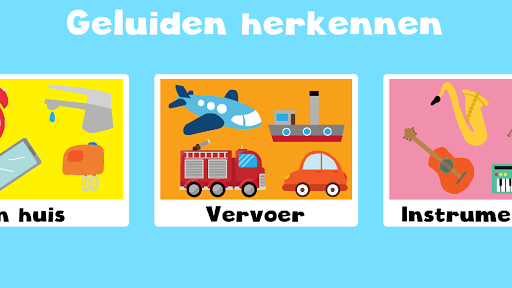
Recognizing sounds
Screenshot
Description
Content
The application Recognizing sounds contains various sounds for children to practice. The sounds are subdivided into five categories, and each category contains 12 sounds. The categories are:
- Farm animals
- Zoo animals
- Vehicles
- At home
- Instruments
For each category children can do three activities: 1. Listening to the sound
2. Guessing the right picture while they hear a sound
3. The children have to match the pictures and the sounds in the game “Memory”.
Have fun playing,
Teacher Dennis.
Introduction
The ability to recognize sounds is a fundamental skill that enables us to interact with our environment and communicate effectively. It is a complex process that involves the auditory system, the brain, and our cognitive abilities. This guide will provide a comprehensive overview of the process of sound recognition, exploring the underlying mechanisms, factors that influence it, and practical strategies for improving our ability to recognize sounds.
The Auditory System and Sound Recognition
The auditory system is responsible for detecting, transmitting, and processing sound. It consists of the outer ear, middle ear, and inner ear. Sound waves enter the outer ear and travel through the ear canal to the eardrum. The eardrum vibrates in response to the sound waves and transmits these vibrations to the middle ear. The middle ear contains three small bones, called ossicles, which amplify the vibrations and transmit them to the inner ear.
The inner ear, or cochlea, is a fluid-filled spiral-shaped structure that contains the auditory receptors. These receptors, called hair cells, convert the mechanical vibrations into electrical signals that are then transmitted to the brain via the auditory nerve.
Brain Processing of Sounds
The auditory nerve carries the electrical signals from the inner ear to the brain. These signals are processed in several different brain regions, including the brainstem, midbrain, and auditory cortex. The brainstem is responsible for the initial processing of sound, including detecting the presence of sound, determining its location, and filtering out background noise. The midbrain is involved in processing the pitch and timbre of sounds. The auditory cortex, located in the temporal lobes of the brain, is responsible for higher-level processing of sound, including recognizing speech and music.
Factors Influencing Sound Recognition
Several factors can influence our ability to recognize sounds, including:
* Age: As we age, our ability to hear high-frequency sounds gradually declines.
* Noise: Exposure to loud noise can damage the hair cells in the inner ear, leading to hearing loss and difficulty recognizing sounds.
* Hearing loss: People with hearing loss may have difficulty recognizing sounds, especially in noisy environments.
* Cognitive abilities: Our cognitive abilities, such as attention, memory, and language skills, play a role in our ability to recognize sounds.
Improving Sound Recognition
There are several strategies that can help improve our ability to recognize sounds:
* Practice: Regularly listening to and identifying different sounds can help improve our ability to recognize them.
* Speech therapy: Speech therapy can help people with hearing loss or other speech-related disorders improve their ability to recognize sounds.
* Auditory training: Auditory training programs can help improve sound recognition skills by exposing listeners to a variety of sounds and gradually increasing the difficulty of the tasks.
* Hearing aids: Hearing aids can amplify sound and help people with hearing loss hear sounds more clearly.
Conclusion
Recognizing sounds is a complex process that involves the auditory system, the brain, and our cognitive abilities. Several factors can influence our ability to recognize sounds, including age, noise exposure, hearing loss, and cognitive abilities. There are several strategies that can help improve our ability to recognize sounds, including practice, speech therapy, auditory training, and hearing aids.
Information
Version
Release date
Nov 21 2019
File size
37.5 MB
Category
Educational
Requires Android
Developer
Meester Dennis
Installs
5K+
ID
com.company.geluidenherkennen
Available on




























